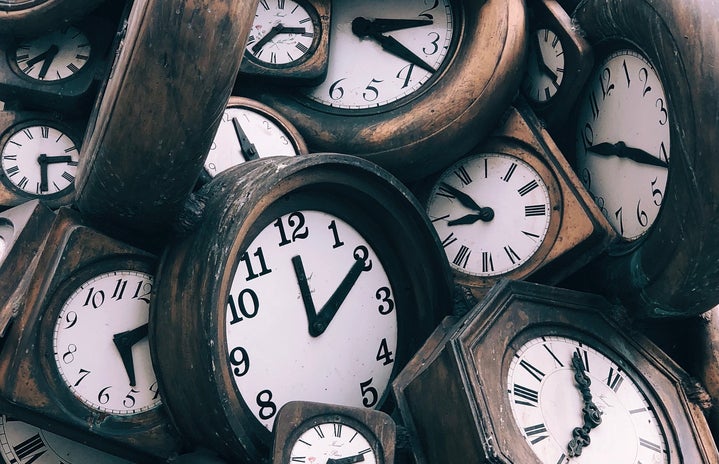The clock never stands still. The clock and my brain, hardwired to run a mile a minute as it carefully crafts every possible catastrophic and cathartic scenario. From the minute I open my eyes to my shrill morning alarms (yes plural alarm’s, I must apologize to my roommate) to the moment I close them for the night, exhausted after attending back-to-back lectures; the clock’s tireless hands have been rotating. My eyes remain fixated on the clock throughout. A second has passed. Then a minute. Then an hour. Then a day. And the cycle repeats. Sleep serves as a temporary repentance from the incessant tick-tock of its hands. Each moment is experienced with only a fraction of my consciousness, as my gaze anxiously darts towards the wristwatch strapped on my left hand, as I position myself to dive headfirst into the next task. As I race to reach report deadlines, complete countless chores and devote quality time to friends and family, the relentless rush of the clock remains in the back of my mind. Why can’t the hands of the clock slow down, even for an instant? Just so I can truly and completely absorb the moment.
Therein, lies the beauty and apprehension of transient time. I can hardly believe I’m closer to my 20th birthday, than my 10th. That my high school graduation was almost two years ago. That summer camp was nine years ago. Somewhere between the two versions of myself, time escaped me. Faint memories of eternal summers are all but lost in my childhood. Summers of ice cream dripping onto pavement in the melting heat, watching an unhealthy amount of cartoons on cable and quarrelling with my younger brother. Summers before I could tell the time on the rustic, mahogany clock perched in the living room (which I admit, was at an age far later than ideal.) Time seemed almost irrelevant somehow, secondary to the object or person that fascinated me. Carefree cycling around my apartment block, having only recently learned to ride without training wheels, until the sun set. Exploring far-away worlds of literature, as the background noises of Bangalore faded into the static night air, while I flipped through worn out pages of yet another book. The number of candles on my birthday cake changed every year, but I never realised that meant I was growing older.
The clock must have malfunctioned, fast-forwarding its dials and catapulting me right into adulthood. For now, I find it nearly impossible to glance away from the clock. My line of vision follows the hands of the clock, 24/7 as the desire to be productive and make efficient use of every minute engulfs me. The pressure to balance academic, social and personal responsibilities grows overbearing, as I immerse myself in micro-planning my daily schedule, scrawled across the whiteboard in blue marker. My restless mind can’t comprehend any pauses or breaks in my schedule. I hear the ticking of the clock far more acutely than the voices of the people I love and visualize the clock’s constant movement more accurately than the beauty of life. I must control time before it slips away. And so, I desperately cling onto the hands of the clock, for if my grip weakens I’ll be swung into the abyss of timelessness. But the tighter I hold on, the quicker time slips through my fingers.
Now, my birthday approaches faster every year. So do my parent’s birthdays. I don’t look forward to them as much, perhaps because I bear the burden of finite time, afraid that within a blink of an eye, life will pass me by. I’m marked by momentous milestones, where my happiness is reliant on winning the trophy, not a participation ribbon. Whether it is bagging your first job or graduating top of your class, my targets appear innumerable but time seems fleeting. No longer eternal, but precious and limited. Time seems so limited that I no longer experience the world from my car window or from listening to the sweet melodies of a street performer. Instead my mind remains embedded in the clock.
As I stare longingly at the clock, praying for time to turn during those brutal 8:30 AM classes, I abruptly realize the clock can never be completely controlled. The passage of time is absolute and attempting to watch the clock every second of the day only leads to burn out. The beauty and simplicity of childhood lay in embracing the moment, by diverting my attention away from the clock to the actual experience. Implementing spontaneity in structure by taking a deep breath and living largely in the present moment erases the fear of time running out. My wandering thoughts on the paradoxical nature of time are sorely interrupted by the professor repeating his question in class.

